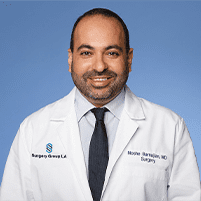Hemorrhoids Specialist

Moshe Barnajian, MD
Minimally Invasive and Robotic Colorectal Surgeon based at Cedars Sinai, Los Angeles
Hemorrhoids Q & A
Why do hemorrhoids develop?
Everyone has some hemorrhoids, which are the cloud-like clusters of veins that lie just beneath the mucous membranes that line your rectum and anus. The abnormal issue — the “piles” or visible hemorrhoids — occurs when those veins become swollen and inflamed.
Hemorrhoids form for a variety of reasons, including straining regularly while passing bowel movements. The added pressure on your lower bowels during pregnancy is also known to cause hemorrhoids. Your risk further increases due to:
- Obesity
- Older age
- Chronic constipation
- Abuse of laxatives or enemas
You may also be genetically prone to developing hemorrhoids, but no matter the cause, they’re not something you should ignore. Hemorrhoids often progress over time and cause worsening symptoms.
Do hemorrhoids cause symptoms?
It just depends on their severity. But hemorrhoids are known for causing anal pain and soreness, especially while trying to pass bowel movements. Your hemorrhoids can also lead to:
- Sore lumps
- Bleeding
- Itching
Hemorrhoids can cause so much discomfort, even pressure from sitting can lead to pain. If you’re experiencing any of these symptoms, contact Dr. Barnajian for an evaluation.
How does a doctor treat hemorrhoids?
For minor-to-moderate hemorrhoid issues, Dr. Barnajian may recommend a combination of conservative issues to help you get relief. Any of the following therapies can alleviate hemorrhoid symptoms:
- Sitz baths
- High-fiber diet
- Fiber supplements
- Increasing your water intake
If symptoms are more severe, Dr. Barnajian could recommend a surgical solution to treat your hemorrhoids.
One of the most common hemorrhoid procedures is a rubber band ligation. This treatment involves placing a small rubber band snugly around your hemorrhoid. The rubber band cuts off the blood supply, which causes the hemorrhoid to shrink and fall off after several days.
Other types of hemorrhoid procedures include:
- Injection and coagulation
- Hemorrhoid stapling
- Surgical removal (hemorrhoidectomy)
Once Dr. Barnajian treats your hemorrhoids, he counsels you about preventive measures. Continuing to boost your fiber and water intake, as well as exercising regularly, can help prevent hemorrhoids from recurring.
Book your hemorrhoid evaluation at the office of Moshe Barnajian, MD, directly through the website. You can also call to schedule your appointment by phone.
